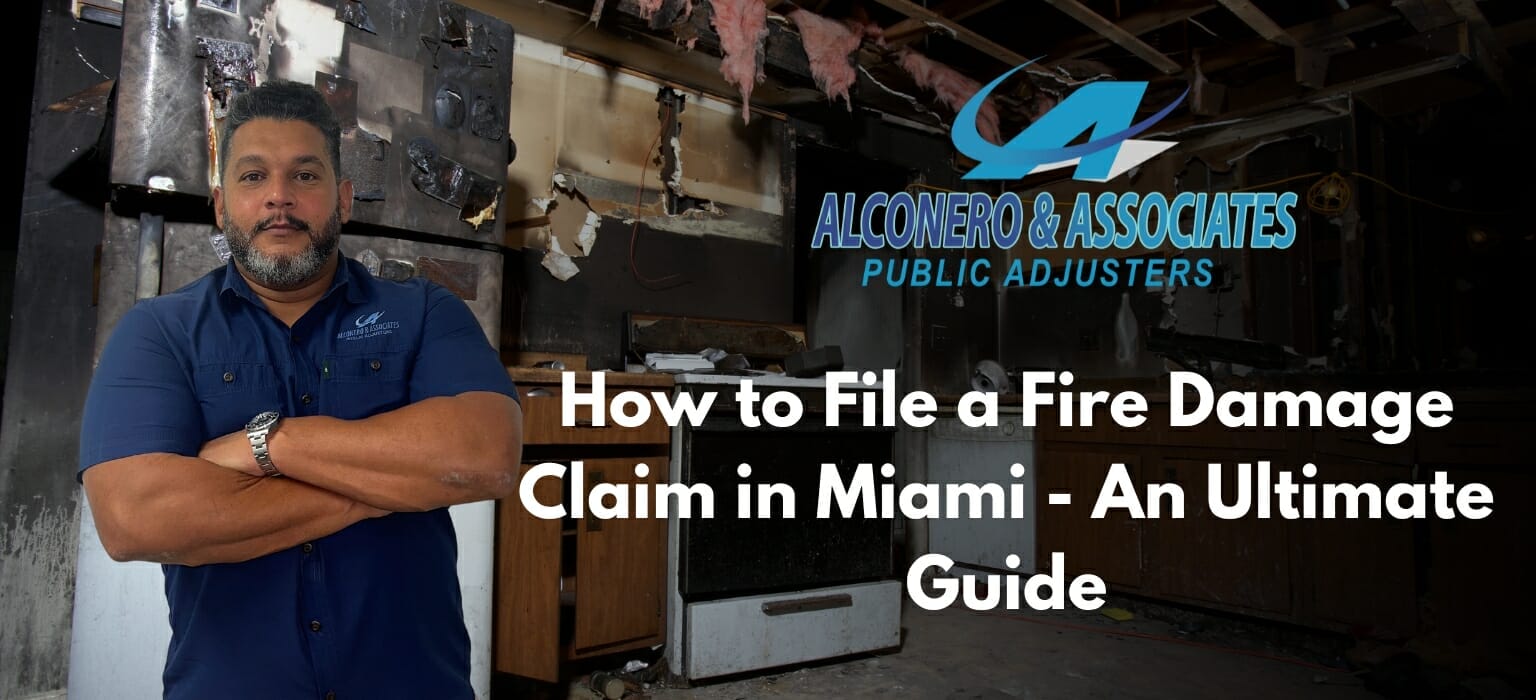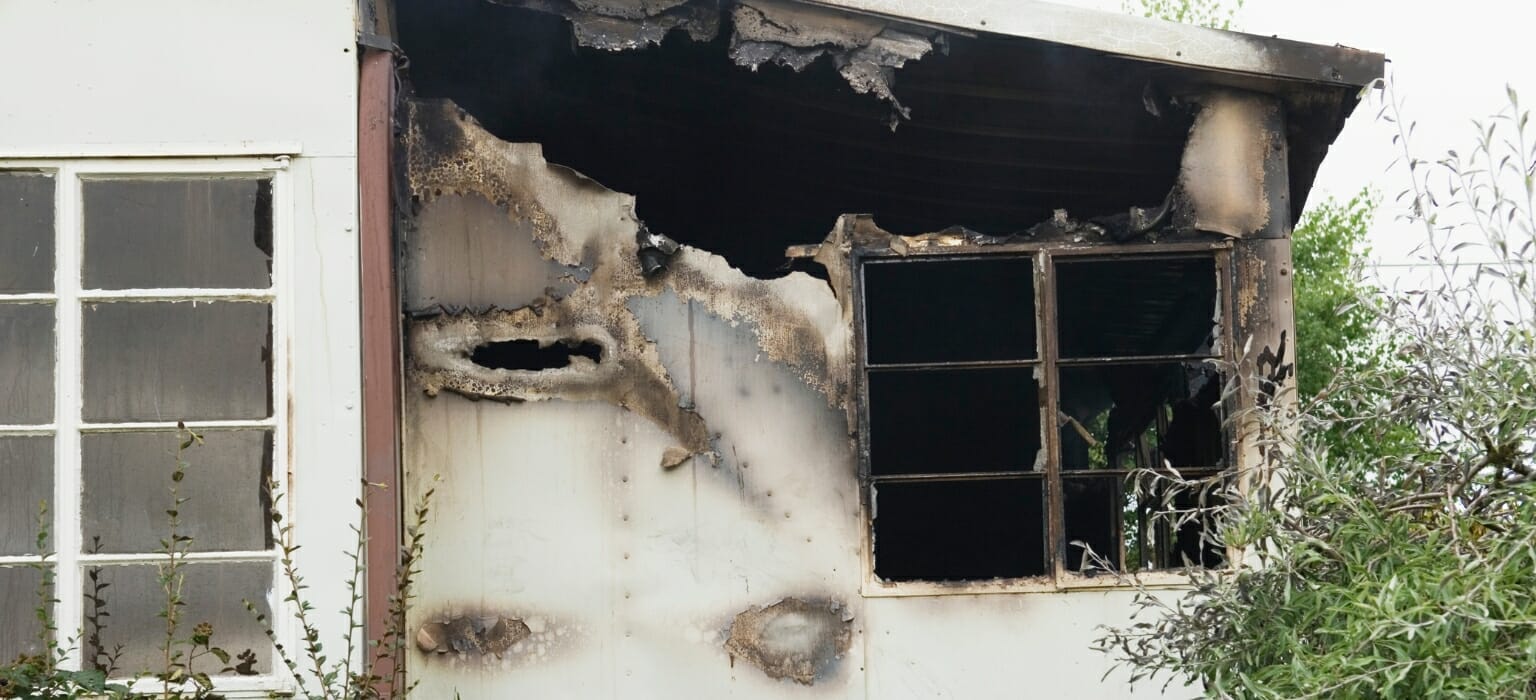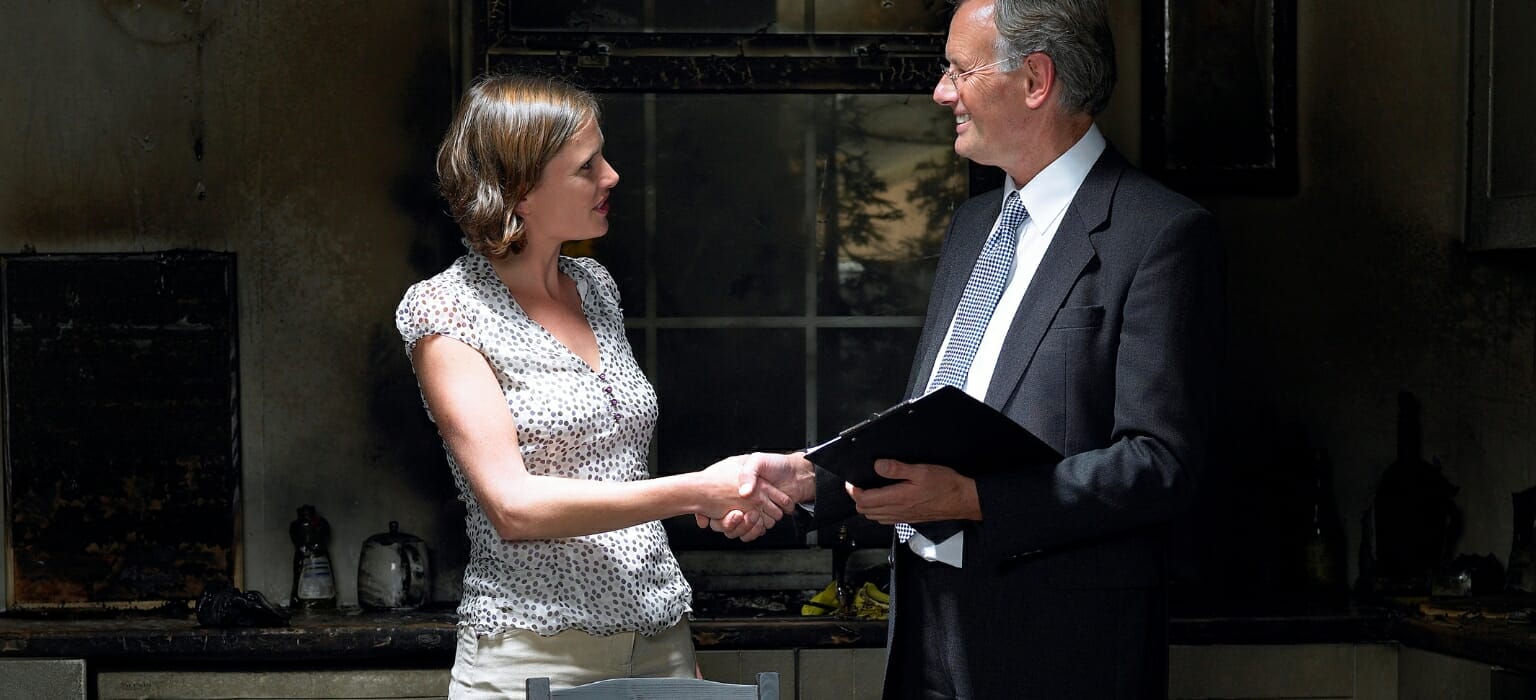
Overview
Filing fire damage claims in Miami is not just about paperwork. It’s about hope, rebuilding, and getting back to everyday life after facing the aftermath of a fire. Miami, famous for its stunning beaches and lively culture, also faces the challenges that fires present. Whether it’s a minor kitchen mishap or a major fire that consumes a property, knowing the ins and outs of fire damage claims is crucial.
In this guide, we’ll simplify the steps and things to consider when filing a fire damage claim in Miami. From immediate actions post-fire to dealing with insurance companies, we’ve got your back. We’ll also highlight common mistakes to sidestep and how to make sure your claim is handled quickly and fairly.
Additionally, we’ll discuss the crucial role of public adjusters, like the dedicated team at Alconero and Associates. With their knowledge, you can trust that your claim process will have your best interests at heart.
By the end of this guide, you’ll have practical tips and a clearer picture of the fire damage claim process in Miami. Whether you’re in Downtown Miami, Coconut Grove, or any part of this vibrant city, remember: knowledge is power. And in fire damage claims, it’s the power to rebuild and move forward confidently.
How to File a Fire Damage Claim in Miami

Experiencing a fire can be distressing, but acting quickly and informed can greatly shape the result of your insurance claim. Here’s a simplified guide on how to file a fire damage claim in Miami:
- Safety First: Your safety is paramount. If there’s a fire, evacuate immediately and call emergency services.
- Immediate Notification: Once you’re safe, inform your insurance company without delay. The sooner you report, the faster they can start the claim process.
- Document Everything: Snap photos and videos of the affected areas. This visual proof is essential when explaining the damage to your insurer.
- Protect Your Property: Consider boarding up shattered windows or covering damaged roofs with tarps. This not only shields your property but also shows your insurer you’re proactive.
- List the Damages: Write down all damaged or lost items and their worth. This helps in figuring out the compensation you should get.
- Stay Organized: Keep all fire-related papers, bills, and communications in one place. This makes interactions with your insurance company smoother.
- Seek Expert Advice: Think about consulting with a public adjuster, like the professionals at Alconero and Associates. They can ensure your claim is spot-on and that you get a just settlement.
Remember, the aftermath of a fire can be daunting, but taking the right steps can mean the difference between a lengthy, tough recovery and a quick, fair resolution to your claim.
Essential Information for Your Miami Fire Damage Insurance Claim
When you’re filing a fire damage claim in Miami, it’s crucial to be thorough and precise. Providing complete and accurate details not only speeds up the claim process but also ensures you get the compensation you truly deserve. Here’s a checklist of vital information to include:
- Policy Details: Start with your insurance policy number and the policyholder’s name. This helps the insurance company quickly find your file and kick off the claim process.
- Date, Time, and Location: Clearly state when and where the fire happened. This sets the context for the claim and aids in its verification.
- Description of Damage: Outline the fire damage in detail. Mention both damages to the property structure and personal belongings. Be as specific as possible.
- Your Contact Information: Share your up-to-date contact details, including phone numbers and email addresses. This ensures timely communication.
- Witness Details: If anyone saw the fire, include their contact details. Their accounts can provide valuable insights.
- Fire Department Report: If you have it, attach the official report from the fire department. This gives an objective view of the fire’s cause and extent.
- Additional Documents: Add any other relevant papers, like bills for emergency repairs or accommodations.
By making sure your claim is detailed and well-documented, you boost your chances of a smooth claim process and a just settlement. For more insights on documenting fire damage, Alconero and Associates offer expert advice.
Documenting Fire Damage in Miami: A Comprehensive Guide

Properly documenting fire damage is pivotal for substantiating your insurance claim in Miami. It offers tangible proof of the damage’s extent, ensuring you’re adequately compensated. Here’s a step-by-step guide to effectively document fire damage:
- Photographs and Videos: Start by taking clear photos and videos of the affected areas. Capture both wide shots to show overall damage and close-ups of specific items. Visual evidence is powerful.
- Detailed Inventory: Make a thorough list of damaged items. For each item, note its description, purchase date, original cost, and estimated replacement value. This list is crucial for determining the claim’s value.
- Preserve Damaged Items: Don’t rush to throw away damaged items. They serve as physical proof. If it’s safe, keep them until the claim process concludes.
- Collect Receipts: Gather receipts or bank statements for valuable items, proving their original value. This strengthens your claim and ensures accurate compensation.
- Fire Department Report: Obtain a copy of the fire department’s official report. It offers an unbiased account of the fire’s cause, which can be vital for your claim.
- Witness Statements: If neighbors or bystanders saw the fire, their accounts can support your claim. Document their statements and contact details.
- Professional Assessment: Consider hiring professionals, like Alconero and Associates, to evaluate the damage. Their expertise can provide a more precise damage valuation.
In essence, thorough documentation is your ally in the fire damage claim process. It strengthens your claim’s credibility and sets the stage for a fair settlement.
Understanding the Timeline for Fire Damage Claims in Miami
When you’ve experienced a fire in Miami, it’s essential to know the expected timeline for your insurance claim. This knowledge helps set realistic expectations and aids in planning your recovery. Here’s a breakdown of the typical duration and factors that can influence the processing time:
- Standard Processing Time: Typically, insurance companies in Miami process fire damage claims within a few days to a couple of weeks. However, the exact time can vary based on the claim’s complexity and the insurance company’s efficiency.
- Prompt Reporting: Reporting the incident immediately can speed up the process. Insurance companies prioritize claims reported swiftly, recognizing the urgency of the situation.
- Claim Complexity: Straightforward claims with clear damages and well-documented evidence can be settled faster. Conversely, claims with extensive damages or disputes might need more time for thorough investigations and negotiations.
- Insurance Company’s Efficiency: While some insurers are quick to send adjusters and process claims, others might be slower. It’s crucial to maintain open communication and regularly check for updates.
- External Factors: Events like natural disasters can flood insurance companies with numerous claims, causing potential delays. Additionally, weekends and holidays can also affect the processing speed.
- Thorough Documentation: As previously discussed, providing comprehensive and accurate documentation can significantly reduce processing time.
In conclusion, while the processing time for fire damage claims in Miami can vary, being proactive, informed, and prepared can lead to a quicker resolution. Remember, patience combined with persistence ensures your claim receives the attention and resolution it deserves.
How to Expedite Your Fire Damage Claim in Miami
While the timeline for processing a fire damage claim in Miami can vary, there are proactive steps homeowners can take to ensure a swift resolution. Here’s your action plan to guarantee a timely and fair settlement:
- Complete Documentation: As emphasized earlier, thorough documentation is paramount. Ensure you have photographs, videos, and a detailed inventory of damaged items. The more comprehensive your evidence, the smoother your claim process will be.
- Open Communication: Stay in regular contact with your insurance company. Promptly responding to their queries and providing any additional information they require can significantly speed up the process.
- Know Your Policy: Familiarize yourself with your insurance policy’s terms and conditions. Understanding your coverage limits, deductibles, and any exclusions can prevent potential misunderstandings and disputes.
- Seek Expert Guidance: Consider consulting with professionals, such as public adjusters in Miami, who can guide you through the intricacies of the claim process, ensuring nothing is overlooked.
- Mitigate Further Damage: Take necessary measures to prevent additional damage to your property. This not only safeguards your home but also demonstrates responsibility, which insurance companies appreciate.
- Stay Organized: Keep all claim-related documents, correspondence, and records in one place. Being organized can significantly reduce delays when information is requested.
- Be Honest: Always provide accurate information. Misrepresentations can lead to delays, disputes, or even claim denials.
By proactively taking these steps, homeowners in Miami can influence a faster claim resolution. Remember, while it’s essential to expedite the process, ensuring the claim is thorough and accurate is equally crucial.
Pitfalls to Sidestep When Filing a Fire Damage Claim in Miami

In the aftermath of a fire in Miami, it’s easy to feel overwhelmed. However, being informed can help you avoid common mistakes that could jeopardize your claim. Here are the pitfalls you should be wary of:
- Overlooking Minor Damages: Major damages might be evident, but don’t neglect minor issues like smoke residue or concealed structural damage. A thorough inspection ensures all damages are accounted for.
- Procrastinating the Claim Process: Time is crucial. Delays can exacerbate damages and raise red flags with the insurance company. Act swiftly.
- Not Reviewing the Insurance Policy: Ensure you’re well-acquainted with your policy’s terms. This knowledge can prevent unexpected challenges down the line.
- Accepting the First Offer: Insurance companies might propose a quick settlement. However, it’s essential to critically assess these offers. If in doubt, consult experts like Miami-based public adjusters.
- Inadequate Documentation: From damages to interactions with the insurance company, every detail matters. Comprehensive documentation can be your strongest ally during disputes.
- Neglecting Damaged Property: Failing to mitigate further damage can be perceived as negligence, affecting your claim’s outcome.
- Misrepresenting Facts: Honesty is paramount. Discrepancies can lead to claim denials or even legal repercussions.
By staying informed and avoiding these common mistakes, Miami homeowners can ensure they receive the compensation they rightfully deserve. Remember, knowledge is power, and in the realm of fire damage claims, it’s the power to rebuild with confidence.
Strategies to Maximize Your Fire Damage Claim in Miami
When disaster strikes, Miami homeowners deserve every penny they’re entitled to. Here’s how to ensure you get the most out of your fire damage claim:
- Engage a Professional Assessor: Before filing your claim, consider hiring a professional to evaluate the extent of the damage. Their expertise can uncover hidden damages that might otherwise go unnoticed.
- Maintain a Detailed Inventory: List every item damaged or lost in the fire. Include descriptions, purchase dates, and estimated values. This meticulous record-keeping can significantly bolster your claim.
- Secure Multiple Repair Estimates: Don’t settle for one repair estimate. By obtaining multiple quotes, you can ensure you’re getting a fair assessment of the repair costs.
- Understand Depreciation: Items lose value over time, but understanding how depreciation is calculated can help you negotiate a better settlement.
- Stay Organized: Keep all related documents, receipts, and correspondence in one place. An organized approach can expedite the claim process and reduce stress.
- Seek Legal Counsel if Necessary: If negotiations become challenging, don’t hesitate to consult a lawyer specializing in insurance claims. Their expertise can be invaluable in navigating complex situations.
- Stay Proactive: Regularly follow up with your insurance company. A proactive approach can keep your claim on track and demonstrate your commitment to resolving the matter.
In the bustling heart of Miami, where life moves at a rapid pace, it’s essential to be equipped with the right strategies when navigating the complexities of fire damage claims. By following these steps, homeowners can confidently secure the compensation they need to rebuild and move forward.
Tactics Insurance Companies Use to Deny Fire Damage Claims
Insurance companies, at their core, are businesses. Their primary goal? Profitability. But sometimes, this drive for profit can lead to strategies designed to reduce payouts. Here’s what every Miami homeowner should be on the lookout for:
- Undervaluing the Damage: It’s not uncommon for insurers to propose a settlement that doesn’t truly capture the full extent of the damage. They might lowball repair costs or undervalue lost items.
- Claiming Pre-existing Damages: Without proper documentation, insurers might assert that some damages were present before the fire.
- Coverage Exclusions: Every policy has its exclusions. Insurers might lean on these, arguing, for instance, that a specific type of fire isn’t covered.
- Questioning the Fire’s Origin: Doubts about the fire’s cause can lead insurers to dig deeper, potentially resulting in claim delays or denials if they suspect intentional wrongdoing.
- Incomplete Documentation: If your documentation isn’t thorough, insurers might question the claim’s legitimacy.
- Policy Technicalities: Something as simple as missing a premium payment can be grounds for denial.
The best defense against these tactics? Knowledge and comprehensive documentation. And if you’re feeling outmatched, consider enlisting the expertise of public adjusters who can champion your cause, ensuring you secure a just settlement.
Signs of Bad Faith Insurance Practices
When you’ve diligently paid your premiums and upheld your part of the insurance agreement, it’s only right to expect your insurer to reciprocate in kind. Yet, some insurance companies might not always play fair. Being able to identify signs of bad faith is your first step to taking decisive action:
- Unreasonable Delays: Sure, processing a claim takes time. But if you’re constantly being given the runaround without a clear reason, that’s a red flag. Insurers might be trying to wear you down.
- Lowball Offers: One of the most prevalent bad faith practices is offering settlements that are a mere fraction of the claim’s actual value. They bank on your desperation or lack of insight.
- Misinterpreting Policy Language: Some insurers might manipulate the policy’s wording to suit their narrative, leading to unjust denials or reduced payouts.
- Failure to Investigate: Every claim deserves a thorough investigation. A hasty denial without proper inquiry? That’s a glaring sign of bad faith.
- Withholding Information: If your insurer is being cagey about why they denied your claim or isn’t informing you about beneficial policy provisions, they’re not acting in your best interest.
- Threats or Coercion: Any attempts to bully or pressure you into accepting a subpar settlement is a blatant breach of good faith.
If you’re sensing bad faith tactics at play, don’t second-guess yourself. Consult with seasoned professionals. Alconero and Associates are here to guide you every step of the way, ensuring your rights remain front and center.
Common Reasons for Fire Damage Claims Denial

Fire damage is a homeowner’s worst nightmare. And the last thing you need during such a traumatic time is to grapple with insurance claim hurdles. By understanding the typical reasons for claim denials, you’re better equipped to navigate the process:
- Lack of Evidence: Insurers aren’t in the business of taking your word for it. They need tangible evidence. Without comprehensive documentation, photos, or videos, they might push back on your claim.
- Policy Exclusions: Every insurance policy has its boundaries. For instance, if the fire resulted from deliberate acts or negligence, you might hit a wall with your claim.
- Lapsed Policies: If your insurance policy was inactive or had lapsed due to missed premium payments when the incident occurred, the insurer has every right to deny the claim.
- Late Reporting: Time is of the essence. If you drag your feet in reporting the incident, it can raise eyebrows and lead to potential claim denial.
- Misrepresentation: Honesty is paramount. If the insurer spots inconsistencies between the actual damage and what you’ve reported, or if they sniff out any fraudulent activity, they’ll shut down your claim.
- Unmaintained Property: A property that’s been neglected, leading to conditions that could spark a fire, might not find favor with insurers.
- Non-disclosure: Keeping your insurer in the dark about certain details, like recent renovations or the storage of flammable materials, can backfire.
But here’s the silver lining: a denial isn’t the end of the road. You have every right to contest the decision. And with the unparalleled expertise of Alconero and Associates, your claim will receive the meticulous attention and resolution it truly deserves.
Actions to Take if the Insurance Company Rejects a Fire Damage Claim
Rejection can sting, especially when you’re already dealing with the aftermath of a fire. But remember this: a denial is not the final verdict. Here’s your game plan to challenge that decision:
- Review the Denial Letter: By law, insurers must spell out their reasons for claim denial. Decode their rationale to strategize your next move effectively.
- Gather Additional Evidence: Bolster your claim. This might mean snapping more detailed photos, seeking expert evaluations, or gathering statements from witnesses.
- Re-evaluate Your Policy: Knowledge is power. Ensure you grasp every nuance of your policy’s terms, conditions, and exclusions. This insight will help you debunk any misconceptions or misunderstandings.
- Open a Line of Communication: Initiate a dialogue with your insurance company. Often, clear communication can iron out simple misunderstandings.
- Consider Mediation: If direct talks hit a wall, think about mediation. A neutral mediator can help both parties find common ground.
- Hire a Public Adjuster: Public adjusters, like the seasoned professionals at Alconero and Associates, can give your claim a fresh pair of eyes, ensuring it’s both accurate and comprehensive. They’ll champion your cause, ensuring your claim gets the scrutiny it deserves.
- Legal Action: When all else fails, the courtroom might be your final battleground. If you’re convinced the insurance company is acting in bad faith, you might have a solid case for a lawsuit.
Remember this: you’re not navigating these choppy waters alone. With determination and the right guidance, you can sail through the complexities of the insurance realm and secure the compensation you rightfully deserve.
Role of a Public Adjuster in Fire Damage Insurance Claims

When calamity strikes, the maze of insurance claims can seem insurmountable. Enter the public adjuster: your guiding light in these trying times.
- Difference Between a Public Adjuster and an Insurance Adjuster: Here’s the stark truth: an insurance adjuster’s paycheck comes from the insurance company, and their mission is to keep the company’s expenses low. On the flip side, a public adjuster is your advocate. Their sole mission? Ensuring you get every penny you’re entitled to.
- Benefits of Hiring a Public Adjuster:
- Expertise: Public adjusters are masters of the insurance realm. They can dissect the intricate language of your policy, ensuring no entitlement goes unnoticed.
- Maximized Settlements: Research has consistently shown that claims managed by public adjusters result in heftier payouts for policyholders.
- Time-saving: Hand over the reins of your claim to a public adjuster, and you can channel your energy into recovery and rebuilding.
- Assistance in Documentation and Valuation: Public adjusters, especially the experts at Alconero and Associates, leave no stone unturned. They document every iota of damage and provide valuations that reflect reality, not the insurance company’s wishful thinking.
- Guidance in the Restoration Process: Beyond the paperwork, public adjusters can steer you through the restoration journey, linking you with trusted contractors and ensuring repairs are top-notch.
In essence, think of hiring a public adjuster as recruiting a seasoned navigator. They’ll guide you through the insurance labyrinth, ensuring you emerge with the compensation you truly deserve.
Questions to Ask a Public Adjuster Before Hiring
Choosing the right public adjuster can be the linchpin in your claim’s success. Before you hand over the reins of your fire damage claim, equip yourself with these essential questions:
- Experience and Expertise:
- “How many years have you been a licensed public adjuster?”
- “Could you share some examples of fire damage claims similar to mine that you’ve managed?”
- Fee Structure:
- “How do you structure your fees? Is it a percentage of the claim or a set fee?”
- “Are there any hidden costs or additional fees I should be aware of?”
- Previous Client Testimonials:
- “Could you provide references or testimonials from satisfied clients?”
- “Have you managed claims in my specific region or community?”
- Claim Handling Process:
- “How will you keep me in the loop throughout the claim process?”
- “What’s the typical timeframe for resolving a claim of my nature?”
- Team and Resources:
- “Do you operate solo, or do you have a team backing you?”
- “What tools or resources do you employ to assess and document damage?”
- Resolution of Disputes:
- “If there’s a disagreement with the insurance company, what’s your strategy?”
- “Have you ever escalated a claim to court or arbitration?”
By posing these questions, you’re not just vetting their qualifications but ensuring the public adjuster you hire aligns with your specific needs. Remember, the success of your claim is intrinsically tied to the expertise and commitment of the adjuster you select.
Finding a Reputable Public Adjuster for a Fire Damage Insurance Claim in Miami
In the aftermath of a fire, emotions run high, and the path forward can seem unclear. Amid this turmoil, selecting a trustworthy public adjuster can be your guiding light. Here’s a step-by-step guide to ensure you’re teaming up with the best:
- Research and Reviews:
- Start with a straightforward online search. Trusted platforms like the National Association of Public Insurance Adjusters can offer a wealth of information.
- Delve into online reviews. Websites like Google, Yelp, and the Better Business Bureau can provide invaluable feedback from previous clients.
- Recommendations and Referrals:
- Never underestimate the power of word of mouth. Consult friends, family, or colleagues who’ve faced similar predicaments.
- Local contractors or real estate agents, given their frequent interactions with adjusters, can also be a rich source of referrals.
- Credentials Check:
- Confirm that the adjuster holds a valid license in Florida. This ensures they’re bound by state regulations and uphold industry standards.
- Ask about any professional affiliations or certifications. These often signify a commitment to continuous learning and maintaining ethical practices.
- Personal Interaction:
- Arrange a face-to-face meeting or a virtual consultation. This interaction allows you to assess their professionalism, empathy, and communication prowess firsthand.
- Trust your gut. If something feels amiss, it likely is.
- Transparency:
- A reputable adjuster will be candid about their fees, the range of services they offer, and any potential conflicts of interest.
By adhering to these steps, you’re not just finding a public adjuster; you’re securing a partner who will champion your claim, ensuring you’re treated fairly and justly. Remember, the right adjuster can be the difference between a drawn-out battle and a swift, satisfactory resolution.
Alconero And Associates Public Adjusters in Miami for Fire Damage Claims
When it comes to championing the rights of policyholders in Miami, Fort Lauderdale and Palm Beach, Alconero and Associates stand head and shoulders above the rest. Their dedication to ensuring fair compensation for fire damage claims is unparalleled. Here’s why they are the gold standard:
- Unmatched Expertise:
- With a rich history of serving Floridians, Alconero and Associates have carved a niche for themselves. Their vast experience is a testament to their proficiency and commitment.
- Holistic Service Suite:
- Whether it’s fire damage, smoke damage, or any other type of insurance claim, their team is primed to handle it all. They are your one-stop solution for all insurance claim needs.
- Client-First Philosophy:
- At Alconero and Associates, clients aren’t just numbers; they’re family. Their transparent communication, coupled with a genuine understanding of the emotional upheaval post-fire, makes them a beacon of trust and reliability.
- Pan-Florida Presence:
- Their services span across the Sunshine State, covering major hubs like Miami, Fort Lauderdale, Palm Beach, and beyond. No matter where you are in Florida, their team is always within reach.
- Empowerment Through Education:
- Knowledge is power. Alconero and Associates firmly believe in this, offering a plethora of educational resources, from FAQs to in-depth articles, ensuring their clients are always informed.
In the wake of a fire, what you need is more than just a public adjuster; you need a steadfast ally. Alconero and Associates are not merely adjusters; they are crusaders who ardently fight for your rights, ensuring that you can rebuild and recover with utmost confidence.
Frequently Asked Questions (FAQs)
1. What immediate steps should I take after experiencing fire damage in Miami?
- First and foremost, ensure everyone’s safety. Immediately contact emergency services. Once the scene is safe, document the damage meticulously through photos and videos. Promptly report the incident to your insurance company to initiate the claim process.
2. How do I document fire damage for my insurance claim?
- Capture clear photographs and videos of all affected areas. Create a detailed inventory of damaged items, noting their estimated value. If available, gather relevant receipts, warranties, or purchase records to substantiate your claim.
3. How long does it typically take for a fire damage insurance claim to be processed in Miami?
- While the processing time can vary based on the claim’s complexity, it generally ranges from a few weeks to several months. Ensuring thorough documentation can expedite the process.
4. What are some common mistakes to avoid when filing a fire damage insurance claim?
- Avoid overlooking minor damages, delaying the claim initiation, or failing to review your insurance policy in its entirety. Each of these oversights can jeopardize your claim’s success.
5. How can I identify bad faith insurance practices?
- Be wary of unnecessary claim processing delays, unreasonably low settlement offers, or any attempts by the insurer to misinterpret policy language. These are telltale signs of bad faith.
6. What should I do if my fire damage claim is denied?
- Begin by understanding the reason for denial provided by the insurer. Strengthen your claim with additional evidence if necessary. Consider seeking legal counsel or hiring a public adjuster, like Alconero and Associates, to champion your cause.
7. How can a public adjuster assist me with my fire damage claim?
- A public adjuster represents your interests, ensuring accurate documentation, providing precise damage valuation, and negotiating with the insurance company for a fair settlement.
8. Why should I consider Alconero and Associates for my fire damage claim in Miami?
- Alconero and Associates have an impeccable track record, a comprehensive service suite, and a client-first approach. Their statewide presence and commitment to client empowerment make them the top choice for fire damage claims in Miami.
Key Takeaways
| Topic | Key Points |
|---|---|
| Tactics by Insurance Companies | – Insurance companies may undervalue damage.
– They might claim damages pre-existed. – Policy exclusions and technicalities can be grounds for denial. |
| Bad Faith Insurance Practices | – Watch out for unreasonable delays and lowball offers.
– Misinterpretation of policy language is a red flag.<br> – Failure to investigate or withholding information indicates bad faith. |
| Reasons for Claims Denial | – Lack of evidence and policy exclusions are common reasons.
– Lapsed policies and late reporting can lead to denials. – Misrepresentation and unmaintained property are also grounds for denial. |
| Actions Post Claim Rejection | – Review the denial letter and gather more evidence.
– Understand your policy and communicate with the insurer. – Consider mediation, hiring a public adjuster, or legal action. |
| Role of a Public Adjuster | – They advocate for the policyholder, not the insurer.
– They offer expertise, maximized settlements, and save time. – They assist in documentation, valuation, and restoration. |
| Choosing a Public Adjuster | – Ask about experience, fee structure, and claim handling process.
– Check for references and past client testimonials. – Ensure transparency and trust your instincts. |
| Finding a Reputable Adjuster | – Research online and check reviews.
– Seek recommendations and verify credentials. – Prioritize personal interaction and gauge professionalism. |
| Alconero and Associates | – They have a proven track record and offer comprehensive services.
– They prioritize clients and cover a wide range of areas in Florida. – They provide educational resources and empower clients. |
| FAQs | – Take immediate steps post-fire and document damages.
– Understand the typical claim processing time. – Recognize common mistakes and signs of bad faith practices. |
